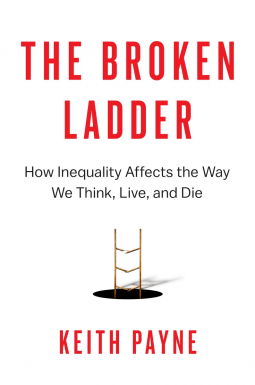
The Broken Ladder
How Inequality Affects the Way We Think, Live, and Die
by Keith Payne
This title was previously available on NetGalley and is now archived.
Buy on Amazon
Buy on BN.com
Buy on Bookshop.org
*This page contains affiliate links, so we may earn a small commission when you make a purchase through links on our site at no additional cost to you.
Send NetGalley books directly to your Kindle or Kindle app
1
To read on a Kindle or Kindle app, please add kindle@netgalley.com as an approved email address to receive files in your Amazon account. Click here for step-by-step instructions.
2
Also find your Kindle email address within your Amazon account, and enter it here.
Pub Date May 02 2017 | Archive Date May 30 2019
PENGUIN GROUP Viking | Viking
Description
"A persuasive and highly readable account." —President Barack Obama
“Brilliant. . . . an important, fascinating read arguing that inequality creates a public health crisis in America.” —Nicholas Kristof, New York Times
“The Broken Ladder is an important, timely, and beautifully written account of how inequality affects us all.” —Adam Alter, New York Times bestselling author of Irresistible and Drunk Tank Pink
A timely examination by a leading scientist of the physical, psychological, and moral effects of inequality.
The levels of inequality in the world today are on a scale that have not been seen in our lifetimes, yet the disparity between rich and poor has ramifications that extend far beyond mere financial means. In The Broken Ladder psychologist Keith Payne examines how inequality divides us not just economically; it also has profound consequences for how we think, how we respond to stress, how our immune systems function, and even how we view moral concepts such as justice and fairness.
Research in psychology, neuroscience, and behavioral economics has not only revealed important new insights into how inequality changes people in predictable ways but also provided a corrective to the flawed view of poverty as being the result of individual character failings. Among modern developed societies, inequality is not primarily a matter of the actual amount of money people have. It is, rather, people's sense of where they stand in relation to others. Feeling poor matters—not just being poor. Regardless of their average incomes, countries or states with greater levels of income inequality have much higher rates of all the social maladies we associate with poverty, including lower than average life expectancies, serious health problems, mental illness, and crime.
The Broken Ladder explores such issues as why women in poor societies often have more children, and why they have them at a younger age; why there is little trust among the working class in the prudence of investing for the future; why people's perception of their social status affects their political beliefs and leads to greater political divisions; how poverty raises stress levels as effectively as actual physical threats; how inequality in the workplace affects performance; and why unequal societies tend to become more religious. Understanding how inequality shapes our world can help us better understand what drives ideological divides, why high inequality makes the middle class feel left behind, and how to disconnect from the endless treadmill of social comparison.
“Brilliant. . . . an important, fascinating read arguing that inequality creates a public health crisis in America.” —Nicholas Kristof, New York Times
“The Broken Ladder is an important, timely, and beautifully written account of how inequality affects us all.” —Adam Alter, New York Times bestselling author of Irresistible and Drunk Tank Pink
A timely examination by a leading scientist of the physical, psychological, and moral effects of inequality.
The levels of inequality in the world today are on a scale that have not been seen in our lifetimes, yet the disparity between rich and poor has ramifications that extend far beyond mere financial means. In The Broken Ladder psychologist Keith Payne examines how inequality divides us not just economically; it also has profound consequences for how we think, how we respond to stress, how our immune systems function, and even how we view moral concepts such as justice and fairness.
Research in psychology, neuroscience, and behavioral economics has not only revealed important new insights into how inequality changes people in predictable ways but also provided a corrective to the flawed view of poverty as being the result of individual character failings. Among modern developed societies, inequality is not primarily a matter of the actual amount of money people have. It is, rather, people's sense of where they stand in relation to others. Feeling poor matters—not just being poor. Regardless of their average incomes, countries or states with greater levels of income inequality have much higher rates of all the social maladies we associate with poverty, including lower than average life expectancies, serious health problems, mental illness, and crime.
The Broken Ladder explores such issues as why women in poor societies often have more children, and why they have them at a younger age; why there is little trust among the working class in the prudence of investing for the future; why people's perception of their social status affects their political beliefs and leads to greater political divisions; how poverty raises stress levels as effectively as actual physical threats; how inequality in the workplace affects performance; and why unequal societies tend to become more religious. Understanding how inequality shapes our world can help us better understand what drives ideological divides, why high inequality makes the middle class feel left behind, and how to disconnect from the endless treadmill of social comparison.
Available Editions
| EDITION | Other Format |
| ISBN | 9780525429814 |
| PRICE | $28.00 (USD) |
| PAGES | 256 |



